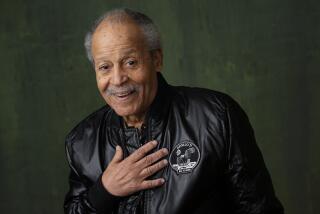Arab Struck by Earth’s Smallness : Space View Would Sober Malcontents, Prince Says
- Share via
EDWARDS AIR FORCE BASE — Many of the world’s problems could be solved if those who cause trouble were able to take a look at the Earth from space, a Saudi Arabian prince said Sunday, as the crew of the space shuttle Discovery prepared for landing here today.
Prince Sultan ibn Salman al Saud, 28, the first Arab to venture into space, said in a press conference from aboard the Discovery that he was struck by the smallness of the globe as the shuttle circled the Earth every 90 minutes, 220 miles above.
Prince Sultan was asked by reporters in Houston if he had any solutions to problems such as the Beirut hijacking that has left the lives of 40 Americans in peril. He suggested that if he could find the answer to that question in space, he would stay there and solve all the world’s problems.
“Looking at it from here, the trouble all over the world, not just the Middle East, looks very strange,” he said. He added that he had told the Discovery commander, Daniel C. Brandenstein, 42, that the Earth is so small that it takes “just a few minutes” for the shuttle “to travel from one end to the other of America.”
“So, I think lots of the people who are causing these problems ought to come up here and take a look,” he said.
Prince Sultan also talked with King Fahd, his uncle, in the royal palace in Saudi Arabia. Speaking in halting English, the king called the shuttle flight “a great achievement.”
Ground crews initially had trouble establishing communications between the shuttle and Fahd. But the Earth-space link finally cleared up, and Prince Sultan talked with his uncle in Arabic from Discovery’s crew cabin for nearly 10 minutes.
“We are proud of your mission,” Fahd said. “I wish to send through you my best wishes to his excellency President Reagan and the friendly American nation.”
“Thank you, sir, for your call,” Prince Sultan said. “I hope that this may be a good deed for Islam, Muslims and the Arab nation.”
Prince Sultan’s fellow foreigner in the three-nation crew, French test pilot Patrick Baudry, 39, told the world that he had managed to accomplish something that the National Aeronautics and Space Administration had said that he could not do.
Wine Taken on Flight
Baudry revealed that he had taken a bottle of wine on the flight, something NASA officials had emphatically denied.
Baudry apparently slipped the wine into a bag of personal belongings that each astronaut was allowed to stow aboard the vehicle. Normally, astronauts take high school emblems and other items that can be exhibited later.
However, the personal bags were stored in an area that could not be reached by the crew, so Baudry was unable to consume the wine he had taken aboard. He said that he will drink it later, “and see if there is any change in the taste in the wine.” He suggested that a little wine and cognac would be just what shuttle crews need “for the good humor and the good quality of the work.”
A telephone hookup between Baudry and the French minister of research and technology, Hubert Curien, did not work.
French Spaceplane
At the press conference, Baudry said that his flight aboard Discovery will help in the development of the smaller spaceplane that his nation hopes to have flying by 1995.
The proposed French shuttle, Hermes, is being designed to serve as a taxi between Earth and a space station.
NASA expects to have a station in operation in 1993, and the European Space Agency is designing a module called Columbus to be attached to the space base.
Brandenstein, meanwhile, used the press conference to applaud his crew.
“The launch of three satellites for three different countries--Morelos for Mexico, Arabsat for the Arab nations and Telesat for AT&T;, a U.S. company, and the deployment and recovery of the Spartan science satellite--we were very proud of those accomplishments,” he said.
Look Forward to Home
Brandenstein also told reporters: “We look forward to wrapping it up today and coming home tomorrow.”
Prince Sultan was added to the crew to monitor the Arabsat relay station, owned by the Arab Satellite Communications Organization, a 21-nation consortium that includes the Palestine Liberation Organization.
The crew spent the rest of Sunday preparing for Discovery’s landing, scheduled for 6:12 a.m., almost one week after blasting off from the Kennedy Space Center in Florida.
Moments before the ship ended its 99th orbit, Mission Control announced that the 100th was named the “Nagel Orbit,” in honor of Discovery astronaut Steven R. Nagel, 38, who is the 100th American in space.
The flight was one of the most trouble-free of the 18 to date, with only a few secondary problems on the spacecraft.
System to Be Tested
The other members of the crew are John O. Creighton, 42, the pilot; John M. Fabian, 46, and Shannon W. Lucid, 42, mission specialists.
Meanwhile, NASA officials in Houston said Sunday that the space shuttle Challenger will blast off on a seven-day Spacelab mission July 12 to test a $60-million instrument pointing system developed by the European Space Agency.
John Cox, flight director, said that the testing of the pointer, which will carry four sun-watching instruments, is the most important aspect of the mission.
The system is to be used in 1986 on a shuttle mission designed to examine Halley’s Comet, and next month’s flight will verify whether it works as expected, Cox said.
More to Read
Sign up for Essential California
The most important California stories and recommendations in your inbox every morning.
You may occasionally receive promotional content from the Los Angeles Times.













